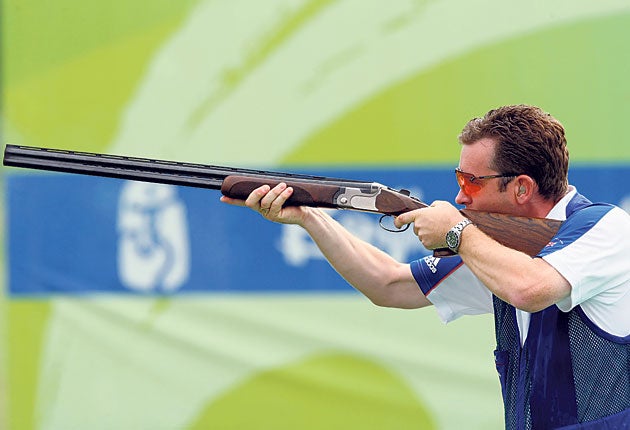Alan Hubbard: Olympic shame as 'minority' sports miss out
The Last Word: Target-obsessed Government in firing line as ethos of what the Games are all about is shot to pieces

Your support helps us to tell the story
From reproductive rights to climate change to Big Tech, The Independent is on the ground when the story is developing. Whether it's investigating the financials of Elon Musk's pro-Trump PAC or producing our latest documentary, 'The A Word', which shines a light on the American women fighting for reproductive rights, we know how important it is to parse out the facts from the messaging.
At such a critical moment in US history, we need reporters on the ground. Your donation allows us to keep sending journalists to speak to both sides of the story.
The Independent is trusted by Americans across the entire political spectrum. And unlike many other quality news outlets, we choose not to lock Americans out of our reporting and analysis with paywalls. We believe quality journalism should be available to everyone, paid for by those who can afford it.
Your support makes all the difference.What was it that dear old Baron de Coubertin said about the Olympics? "The most important thing is not winning but taking part; the essential thing in life is not conquering but fighting well." It is an adage that rings hollow as Britain goes prospecting in the great gold rush of 2012, which is turning east London into the new Klondike.
This winning-is-everything mentality is the result of a target-obsessed, Government-driven policy of "no compromise" which means that those who have achieved results get rewarded, and those who haven't, well, hard cheese. Thus we see sport's little people being sacrificed at the altar of glory for a chosen few.
Moreover, too little, it seems, is being done to change the face of British sport dramatically, which we were assured would be the case when London won the bid largely on a single word back in 2005: "legacy". But as the months pass, and with the Games now just three years away, an increasing number are asking exactly where that legacy lies.
Among them is Tessa Sanderson, six times an Olympian, javelin gold medallist in 1984 and herself an ambassador for 2012. She says we are in danger of losing sight of what the Games should be about. That word "legacy". She suggests priorities are wrong and that too much money is being directed into elite sports because of the chances of medals and not enough into talent-nurturing schemes to find the next generation of sporting stars. She runs one such scheme herself, the Newham Academy, deep in Olympic heartland, designed to develop the young talent that abounds in the area, largely among kids from deprived backgrounds.
Is enough being done to take advantage of the Games? "I don't think so, absolutely not," she says. "There's so much more we can do. Kids don't really understand lip service. They want to see things physically done."
Her academy is run with backing from the local council but there is no sponsorship and no Government or Lottery funding. "We started from nowhere and now have 69 members but it is totally wrong that I have to keep begging for cash. Surely there has to be some corporate and social responsibility to see what is going on here and that these youngsters, and thousands like them, need a bit of help from the Games."
One who agrees is the shadow sports spokesman, Hugh Robertson, who, if the election goes the Tories' way, is likely to be minister in charge of the Olympics. "I become more worried by the day that the mass-participation sports legacy is not going to be there in anything like the way it should," he says. "I'd like to ensure that as a result of having hosted the Games, every Olympic sport is better off."
One sport which certainly won't be is shooting, in which Britain has a decent Olympic tradition but which is paying a harsh penalty for misfiring in Beijing. Consequently it has seen its UK Sport funding savagely reduced by three-quarters, the biggest casualty of the £50 million Government shortfall, resulting in the redundancy of its able performance director and cutbacks in a training programme which mean that some who had hoped to compete in London won't make it. And there is unlikely to be any legacy for the sport in the perverse decision to hold the event at the Royal Artillery Barracks in Woolwich rather than globally renowned Bisley, its natural home. Robertson, himself a former military man, believes it is an unsuitable venue and one unlikely to be used again for a politically non grata sport which has long been a victim of the PC brigade in Westminster.
Because the available funding was unsympathetically spread, there is now even the real possibility that some sports may not make it to the starting line in London, let alone get competitors on the podium, as they no longer have the wherewithal.
Surely it is these eight "minority" sports – shooting, weightlifting, wrestling, water polo, fencing, handball, table tennis and volleyball – with cuts averaging 50 per cent and left clutching at a shoestring, which need financial succour to encourage them to do better in London. They could at least fulfil the pledge given by Seb Coe when the Games were won that they would be Britain's shop window for all Olympic sports, and not just those which might bring home the bacon and the bullion. De Coubertin's ethos seems to have been summarily scrapped, and we could already be witnessing the end of many individual Olympic dreams. Is that what London's legacy should be about?
Join our commenting forum
Join thought-provoking conversations, follow other Independent readers and see their replies
Comments